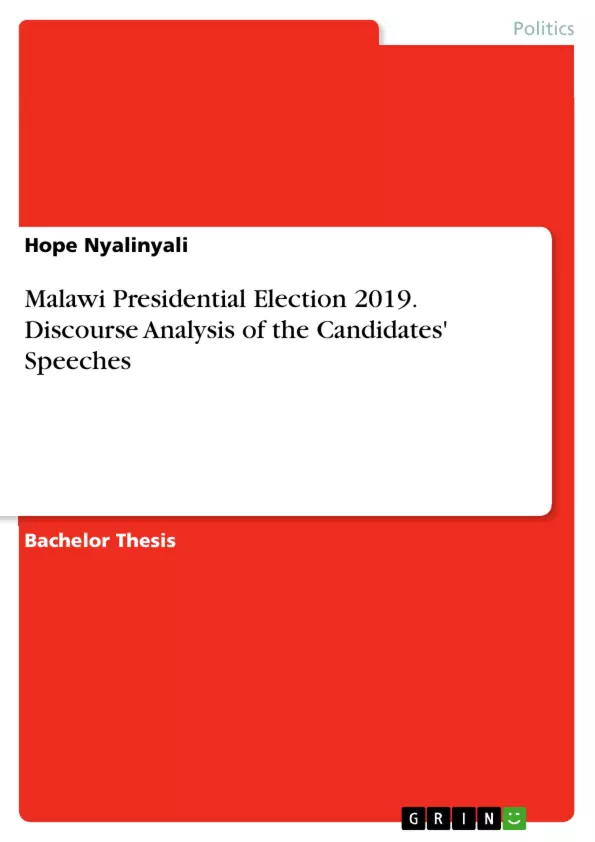This study analyzed three selected speeches from candidates in the 2019 Presidential election in Malawi. The author discusses speeches by Saulos Chilima, Peter Mutharika and Lazarus Chakwera in order find out the discourse strategies that were used in the resepective political campaigns.
The study employes a qualitative research design in order to answer the research question. Further, it uses a critical discourse analysis to analyze how language was used in the political campaigns. The study discoveres that the three presidential candidates used several discourse strategies to win the votes of the people. Some of the discourse strategies employed include the use of collective and singular pronouns to position political actors differently on the focus of responsibility and unity and the excessive use of metaphors. Furthermore, presidential candidates also used evidence and authority to support their arguments in an effort to garner support from the electorates. Choice of words was used to exclude and discriminate others from the contest. It was also discovered that political actors used opaque language in their speeches to hide their agenda of winning consent from the people.
The author of this text is not a native English speaker. Please excuse any grammatical errors and other inconsistencies.
Inhaltsverzeichnis (Table of Contents)
- Chapter 1: Introduction
- 1.1 Background to the Study
- 1.2 Statement of the Problem
- 1.3 Purpose of the Study
- 1.4 Research Questions
- 1.5 Objectives of the Study
- 1.6 Significance of the Study
- 1.7 Scope and Delimitations of the Study
- 1.8 Operational Definition of Terms
- Chapter 2: Literature Review
- 2.1 Discourse Analysis
- 2.2 Critical Discourse Analysis
- 2.3 Political Discourse
- 2.4 Discourse Strategies
- 2.5 The Malawi Political Landscape
- Chapter 3: Research Methodology
- 3.1 Research Design
- 3.2 Data Collection Methods
- 3.3 Data Analysis Methods
- Chapter 4: Data Presentation and Analysis
- 4.1 Analysis of Saulos Chilima's Speech
- 4.2 Analysis of Peter Mutharika's Speech
- 4.3 Analysis of Lazarus Chakwera's Speech
- Chapter 5: Discussion and Conclusion
- 5.1 Summary of Findings
- 5.2 Discussion of Findings
- 5.3 Recommendations
- 5.4 Conclusion
Zielsetzung und Themenschwerpunkte (Objectives and Key Themes)
This dissertation aims to analyze the discourse strategies used in the 2019 political campaign speeches of three presidential candidates in Malawi: Saulos Chilima, Peter Mutharika, and Lazarus Chakwera. The study utilizes Critical Discourse Analysis (CDA) to explore the linguistic choices employed by these candidates to garner support from the electorate. The research is focused on understanding how language influences political discourse and how these strategies aim to win the consent of the Malawian people.
- Discourse strategies in political speeches
- Critical Discourse Analysis (CDA) as a framework for analyzing language
- The use of language to shape political narratives and influence public opinion
- The role of discourse in political campaigns and electoral processes
- The power of language to influence decision-making and social change
Zusammenfassung der Kapitel (Chapter Summaries)
Chapter 1 introduces the study, outlining the research problem, purpose, questions, objectives, and significance. It also defines key terms and clarifies the scope of the study. Chapter 2 provides a comprehensive review of relevant literature, focusing on discourse analysis, CDA, political discourse, discourse strategies, and the Malawi political landscape. This chapter establishes a theoretical framework for the study, drawing on existing knowledge to inform the research questions. Chapter 3 delves into the research methodology, explaining the qualitative research design employed, data collection methods, and data analysis techniques. The chapter outlines the specific procedures used to gather and analyze data relevant to the research objectives. Chapter 4 presents and analyzes the collected data, focusing on the speeches of Saulos Chilima, Peter Mutharika, and Lazarus Chakwera. This chapter examines the discourse strategies used in each speech, identifying patterns and themes related to language choices and political narratives. Chapter 5 offers a comprehensive discussion of the findings, drawing conclusions from the analysis of the speeches. It highlights the key insights gained, offers recommendations for future research, and provides a concluding statement that summarizes the main contributions of the study.
Schlüsselwörter (Keywords)
This dissertation explores the discourse strategies employed in Malawian political speeches, focusing on the 2019 presidential campaign. Key themes include Critical Discourse Analysis (CDA), language use in politics, political narratives, discourse strategies, and the influence of language on public opinion and decision-making. It examines how these strategies are used to shape political discourse, win electoral support, and influence social change. The research provides insights into the dynamics of political communication and the power of language in shaping political outcomes.
Frequently Asked Questions
What is the main focus of this study on the Malawi 2019 elections?
The study analyzes the discourse strategies used in the campaign speeches of presidential candidates Saulos Chilima, Peter Mutharika, and Lazarus Chakwera.
Which methodology was used to analyze the speeches?
The author employed a qualitative research design and Critical Discourse Analysis (CDA) to examine how language was used to influence voters.
What discourse strategies did the candidates use?
Strategies included the use of collective and singular pronouns to define responsibility, metaphors, and the use of evidence and authority to support arguments.
How did candidates use language to exclude others?
The study found that specific word choices were used to discriminate against opponents and exclude them from the political contest.
What is meant by "opaque language" in these speeches?
Opaque language refers to the use of ambiguous or unclear terms intended to hide specific agendas while winning the consent of the public.
Why are metaphors significant in Malawian political discourse?
The study identifies an excessive use of metaphors as a key tool for candidates to shape narratives and influence public opinion.
- Quote paper
- Hope Nyalinyali (Author), 2020, Malawi Presidential Election 2019. Discourse Analysis of the Candidates' Speeches, Munich, GRIN Verlag, https://www.grin.com/document/1342148



